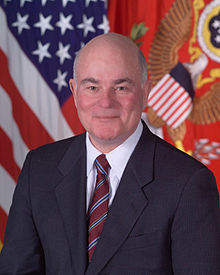Francis J. Harvey
Francis Harvey | |
|---|---|
 Official portrait, 2004 | |
| 19th United States Secretary of the Army | |
| In office November 19, 2004 – March 9, 2007 | |
| President | George W. Bush |
| Preceded by | Thomas E. White |
| Succeeded by | Pete Geren |
| Personal details | |
| Born | Francis Joseph Harvey July 8, 1943 Latrobe, Pennsylvania, U.S. |
| Political party | Republican |
| Education | University of Notre Dame (BS) University of Pennsylvania (MS, PhD) |
Francis Joseph Harvey (born July 8, 1943) served as the 19th Secretary of the United States Army from November 19, 2004, to March 9, 2007.
Education and family
Francis J. Harvey II was born and raised in
As of 2013, he and his wife of fifty-two years, Mary, have two boys. They also have five grandchildren.[2]
Career
The majority of Harvey's career was spent with corporations that provided products and services to the
Harvey held various professional, management and executive positions within the
Secretary of the Army
Harvey was nominated to be
Walter Reed incident and resignation
In the wake of the Walter Reed Army Medical Center neglect scandal, Harvey announced his resignation on March 2, 2007, after being asked to do so by Secretary of Defense Robert Gates,[5] with effect from March 9.[6] In his memoirs, Gates cited Harvey's appointment of Army Surgeon-General Kevin C. Kiley as temporary hospital commander. This appointment "was greeted with dismay by many wounded warriors and their families" because many of these problems arose during Kiley's previous command of the hospital. Gates also cited Harvey's "unconscionable" attempt to blame the problems on "some NCOs who weren't doing their job".[7]
Gates described Harvey as "a good man who had rendered distinguished service to the country. I fired him because once informed of the circumstances at Walter Reed, he did not take the problem serious enough".[8]
References
- ^ "Latrobe Man Gets Degree." Latrobe, Pennsylvania: Latrobe Bulletin, March 4, 1969, p. 1 (subscription required).
- ^ Associated Press (March 2, 2007). Biographical Info on Francis J. Harvey.
- ^ Personnel Announcement
- ^ DefenseLINK - Page Not Found (404)
- ^ Lawmakers vow action on Walter Reed - Military - MSNBC.com
- ^ Secretary Harvey Says Farewell
- ISBN 978-0-307-95947-8.
- ISBN 978-0-307-95947-8.
- Garcia, Charles P. Leadership Lessons of the White House Fellows: Learn How to Inspire Others, Achieve Greatness, and Find Success in Any Organization. New York: McGraw-Hill, 2009. ISBN 0071598480


